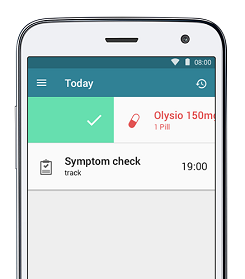Say Goodbye to Hep C: Use an App to Help You Track Your Treatment
By Generating Constant and Reliable Medication Reminders and Allowing You to Track Your Well-Being, MyTherapy Can Help You Fight Hepatitis C Effectively

Hepatitis C is a blood-borne virus that mainly affects the liver. If it is not treated, it can lead to serious complications such as liver scarring (cirrhosis) and liver cancer. In some cases, the body’s immune system manages to fight off the infection by itself, but usually medication is necessary. A course of hepatitis C medication treatment lasts for about two to six months and consists of a combination of different pills or injections. Because hepatitis C is often asymptomatic, it can be challenging to remember to take your medication. Smartphone apps can offer you support and help you adhere to your treatment plans.
MyTherapy, a medication reminder and health tracker app, was developed to help patients who need to take long-term medication. The app generates medication reminders that can easily be adjusted for specific times and dosages. With MyTherapy, which has been proven to increase medication adherence rates significantly, you, as the patient, can have peace of mind regarding your health and getting better.
In addition to being a medication reminder, MyTherapy also comes with a built-in health journal. With this journal, you can track your symptoms, any possible side-effects of the medication, and health information such as weight or blood test results. The information in the health journal, along with other information you’ve recorded in the app, can be printed out and shared with your doctor or another healthcare professional. Your doctor can then use the journal as a reliable source of information to monitor the progress of the treatment and – if the therapy is not going as planned – adjust the treatment plan accordingly.
The team at MyTherapy takes user feedback seriously. This ensures that we continuously try our best to deliver an app tailored to our users’ needs. The app is simple to use and easy to understand, and we improve upon these aspects as often as possible. For example, instead of manually entering medication names, you can simply add your medication by scanning the barcode of the packaging (currently only available in certain countries). The app can therefore offer valuable support to patients of any age with hepatitis C infection.
Hepatitis C: What You Should Know
Hepatitis C is a liver disease that is caused by the hepatitis virus (HCV). The virus is transmitted through the blood or bodily fluids of an infected person. It can therefore be caught via sharing drugs and needles, having unprotected sex, blood transfusions, and mother-to-child transmission. There is also a small risk of getting infected by sharing razors and toothbrushes that are contaminated with infected blood.
Hepatitis C is often asymptomatic and people do not realize that they are infected. Globally, it is estimated that 71 million people have chronic hepatitis C. If the virus is not treated, it can lead to scarring of the liver (cirrhosis) or liver cancer. Around 400 000 people die each year from hepatitis C, but antiviral medicines can cure more that 95% of persons living with it. In the UK, recent data indicates the first decline in deaths from HCV in more than a decade. This is mostly due to increased treatment with new antiviral drugs.
There are six different types of the hepatitis C virus, and each type has a different genetic sequence (genotypes). These types are numbered 1 to 6. The hepatitis C virus can either be acute or chronic and ranges in severity from a mild illness that lasts only a few weeks to a chronic and serious illness. Chronic hepatitis C begins as acute hepatitis and then progresses to the long-lasting stage. About 15% of infected persons (with acute HCV) spontaneously clear the virus within six months of infection without having had any treatment.
While acute HCV infection is typically asymptomatic, symptoms may develop seven to eight weeks after contracting the virus. These symptoms are flu-like and may include:
- Nausea
- Loss of appetite
- Abdominal pain
- Joint pains
- Diarrhea
- Exhaustion
Between 75-85% of people with acute HCV will develop chronic hepatitis. Chronic hepatitis is much harder for the body to fight and can cause liver cancer and cirrhosis. Signs that the liver is not functioning as it should include:
- Dark yellow urine
- Water retention
- Bleeding and bruising easily
- Yellowing in the eyes or skin (jaundice)
Chronic hepatitis C may also affect other parts of the body and can cause vasculitis (inflammation of blood vessels), kidney disease, skin disorders, cardiovascular diseases, metabolic diseases, different types of cancer, or diseases of the lymphatic system.
If you experience any symptoms of hepatitis C or if you are at risk of being infected, you should go and see a healthcare professional as soon as possible. A simple blood test can confirm whether you have contracted the virus. Early diagnosis and treatment is important to prevent liver damage and to minimize the chance of infecting other people.
Hepatitis C: It Can Be Cured
Currently, no vaccine against Hepatitis C is available and the infection can only be treated with a combination of different medications. Over the last few years, treatment for hepatitis C has improved dramatically. Previously, the main treatment for hepatitis C involved two types of medicines, namely pegylated interferon and ribavirin, which prevent the virus from multiplying in the body. Pegylated interferon is taken as a weekly injection and ribavirin is taken as a daily tablet or capsule. Today’s therapies exist in pill form (no injections needed), have very few side-effects, double the cure rate, and work in as little as eight to 12 weeks. These new wonder drugs (also known as DDAs) can cure between 90 to 100% of people infected with hepatitis C. These new DDAs simplify treatment, which means that more primary care doctors (and not just specialists) may be able to treat people with HCV with ease. Doctors usually suggest a combination of different medications to treat the infection and although the side effects are few and far between, they can include tiredness, nausea, headaches, and depression. If the side effects are severe, the doctor will then change the treatment plan. A course of treatment usually lasts between two to six months and its efficacy depends on the genotype of the virus and how quickly a diagnosis is made.
Start MyTherapy and Begin Your Journey to Recovery
Hepatitis C is a liver infection that can lead to serious complications. For this reason, it is important to cure the infection as soon as possible with the right combination of medication. MyTherapy was developed by smartpatient to support patients with long-term illnesses like hepatitis C. The app generates medication reminders, which transform the task of remembering medication into simple everyday to-do lists on the smartphone. Moreover, the integrated health journal makes it possible for you to track the progress of your treatment and adjust the therapy plan if needed. Furthermore, the app can also be used as a reminder for upcoming doctor’s appointments. With MyTherapy, you can rest assured that you can be cured.


